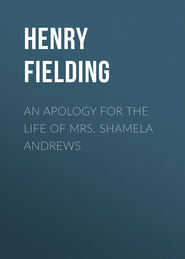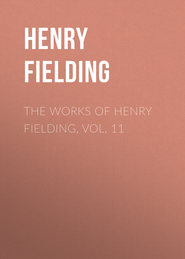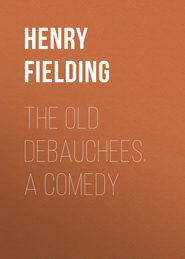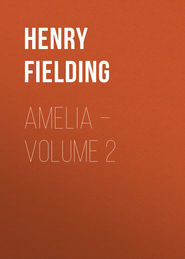По всем вопросам обращайтесь на: info@litportal.ru
(©) 2003-2024.
✖
Amelia – Volume 3
Настройки чтения
Размер шрифта
Высота строк
Поля
Amelia, who had long since forgot the dislike she had taken to Mrs. James at her first seeing her in town, had attributed it to the right cause, and had begun to resume her former friendship for her, expressed very warm sentiments of gratitude on this occasion. She told Mrs. James she should be eternally obliged to her if she could succeed in her kind endeavours; for that the thoughts of parting again with her husband had given her the utmost concern. "Indeed," added she, "I cannot help saying he hath some merit in the service, for he hath received two dreadful wounds in it, one of which very greatly endangered his life; and I am convinced, if his pretensions were backed with any interest, he would not fail of success."
"They shall be backed with interest," cries Mrs. James, "if my husband hath any. He hath no favour to ask for himself, nor for any other friend that I know of; and, indeed, to grant a man his just due, ought hardly to be thought a favour. Resume your old gaiety, therefore, my dear Emily. Lord! I remember the time when you was much the gayer creature of the two. But you make an arrant mope of yourself by confining yourself at home – one never meets you anywhere. Come, you shall go with me to the Lady Betty Castleton's."
"Indeed, you must excuse me, my dear," answered Amelia, "I do not know Lady Betty."
"Not know Lady Betty! how, is that possible? – but no matter, I will introduce you. She keeps a morning rout; hardly a rout, indeed; a little bit of a drum – only four or five tables. Come, take your capuchine; you positively shall go. Booth, you shall go with us too. Though you are with your wife, another woman will keep you in countenance."
"La! child," cries Amelia, "how you rattle!"
"I am in spirits," answered Mrs. James, "this morning; for I won four rubbers together last night; and betted the things, and won almost every bet. I am in luck, and we will contrive to be partners – Come."
"Nay, child, you shall not refuse Mrs. James," said Booth.
"I have scarce seen my children to-day," answered Amelia. "Besides, I mortally detest cards."
"Detest cards!" cries Mrs. James. "How can you be so stupid? I would not live a day without them – nay, indeed, I do not believe I should be able to exist. Is there so delightful a sight in the world as the four honours in one's own hand, unless it be three natural aces at bragg? – And you really hate cards?"
"Upon reflexion," cries Amelia, "I have sometimes had great pleasure in them – in seeing my children build houses with them. My little boy is so dexterous that he will sometimes build up the whole pack."
"Indeed, Booth," cries Mrs. James, "this good woman of yours is strangely altered since I knew her first; but she will always be a good creature."
"Upon my word, my dear," cries Amelia, "you are altered too very greatly; but I doubt not to live to see you alter again, when you come to have as many children as I have."
"Children!" cries Mrs. James; "you make me shudder. How can you envy me the only circumstance which makes matrimony comfortable?"
"Indeed, my dear," said Amelia, "you injure me; for I envy no woman's happiness in marriage." At these words such looks past between Booth and his wife as, to a sensible by-stander, would have made all the airs of Mrs. James appear in the highest degree contemptible, and would have rendered herself the object of compassion. Nor could that lady avoid looking a little silly on the occasion.
Amelia now, at the earnest desire of her husband, accoutred herself to attend her friend; but first she insisted on visiting her children, to whom she gave several hearty kisses, and then, recommending them to the care of Mrs. Atkinson, she and her husband accompanied Mrs. James to the rout; where few of my fine readers will be displeased to make part of the company.
The two ladies and Booth then entered an apartment beset with card- tables, like the rooms at Bath and Tunbridge. Mrs. James immediately introduced her friends to Lady Betty, who received them very civily, and presently engaged Booth and Mrs. James in a party at whist; for, as to Amelia, she so much declined playing, that as the party could be filled without her, she was permitted to sit by.
And now, who should make his appearance but the noble peer of whom so much honourable mention hath already been made in this history? He walked directly up to Amelia, and addressed her with as perfect a confidence as if he had not been in the least conscious of having in any manner displeased her; though the reader will hardly suppose that Mrs. Ellison had kept anything a secret from him.
Amelia was not, however, so forgetful. She made him a very distant courtesy, would scarce vouchsafe an answer to anything he said, and took the first opportunity of shifting her chair and retiring from him.
Her behaviour, indeed, was such that the peer plainly perceived that he should get no advantage by pursuing her any farther at present. Instead, therefore, of attempting to follow her, he turned on his heel and addressed his discourse to another lady, though he could not avoid often casting his eyes towards Amelia as long as she remained in the room.
Fortune, which seems to have been generally no great friend to Mr. Booth, gave him no extraordinary marks of her favour at play. He lost two full rubbers, which cost him five guineas; after which, Amelia, who was uneasy at his lordship's presence, begged him in a whisper to return home; with which request he directly complied.
Nothing, I think, remarkable happened to Booth, unless the renewal of his acquaintance with an officer whom he had known abroad, and who made one of his party at the whist-table.
The name of this gentleman, with whom the reader will hereafter be better acquainted, was Trent. He had formerly been in the same regiment with Booth, and there was some intimacy between them. Captain Trent exprest great delight in meeting his brother officer, and both mutually promised to visit each other.
The scenes which had past the preceding night and that morning had so confused Amelia's thoughts, that, in the hurry in which she was carried off by Mrs. James, she had entirely forgot her appointment with Dr Harrison. When she was informed at her return home that the doctor had been to wait upon her, and had expressed some anger at her being gone out, she became greatly uneasy, and begged of her husband to go to the doctor's lodgings and make her apology.
But lest the reader should be as angry with the doctor as he had declared himself with Amelia, we think proper to explain the matter. Nothing then was farther from the doctor's mind than the conception of any anger towards Amelia. On the contrary, when the girl answered him that her mistress was not at home, the doctor said with great good humour, "How! not at home! then tell your mistress she is a giddy vagabond, and I will come to see her no more till she sends for me." This the poor girl, from misunderstanding one word, and half forgetting the rest, had construed into great passion, several very bad words, and a declaration that he would never see Amelia any more.
Chapter viii.
In which two strangers make their appearance
Booth went to the doctor's lodgings, and found him engaged with his country friend and his son, a young gentleman who was lately in orders; both whom the doctor had left, to keep his appointment with Amelia.
After what we mentioned at the end of the last chapter, we need take little notice of the apology made by Booth, or the doctor's reception of it, which was in his peculiar manner. "Your wife," said he, "is a vain hussy to think herself worth my anger; but tell her I have the vanity myself to think I cannot be angry without a better cause. And yet tell her I intend to punish her for her levity; for, if you go abroad, I have determined to take her down with me into the country, and make her do penance there till you return."
"Dear sir," said Booth, "I know not how to thank you if you are in earnest."
"I assure you then I am in earnest," cries the doctor; "but you need not thank me, however, since you know not how."
"But would not that, sir," said Booth, "be shewing a slight to the colonel's invitation? and you know I have so many obligations to him."
"Don't tell me of the colonel," cries the doctor; "the church is to be first served. Besides, sir, I have priority of right, even to you yourself. You stole my little lamb from me; for I was her first love."
"Well, sir," cries Booth, "if I should be so unhappy to leave her to any one, she must herself determine; and, I believe, it will not be difficult to guess where her choice will fall; for of all men, next to her husband, I believe, none can contend with Dr Harrison in her favour."
"Since you say so," cries the doctor, "fetch her hither to dinner with us; for I am at least so good a Christian to love those that love me – I will shew you my daughter, my old friend, for I am really proud of her – and you may bring my grand-children with you if you please."
Booth made some compliments, and then went on his errand. As soon as he was gone the old gentleman said to the doctor, "Pray, my good friend, what daughter is this of yours? I never so much as heard that you was married."
"And what then," cries the doctor; "did you ever hear that a pope was married? and yet some of them have had sons and daughters, I believe; but, however, this young gentleman will absolve me without obliging me to penance."
"I have not yet that power," answered the young clergyman; "for I am only in deacon's orders."
"Are you not?" cries the doctor; "why then I will absolve myself. You are to know then, my good friend, that this young lady was the daughter of a neighbour of mine, who is since dead, and whose sins I hope are forgiven; for she had too much to answer for on her child's account. Her father was my intimate acquaintance and friend; a worthier man, indeed, I believe never lived. He died suddenly when his children were infants; and, perhaps, to the suddenness of his death it was owing that he did not recommend any care of them to me. However, I, in some measure, took that charge upon me; and particularly of her whom I call my daughter. Indeed, as she grew up she discovered so many good qualities that she wanted not the remembrance of her father's merit to recommend her. I do her no more than justice when I say she is one of the best creatures I ever knew. She hath a sweetness of temper, a generosity of spirit, an openness of heart – in a word, she hath a true Christian disposition. I may call her an Israelite indeed, in whom there is no guile."
"I wish you joy of your daughter," cries the old gentleman; "for to a man of your disposition, to find out an adequate object of your benevolence, is, I acknowledge, to find a treasure."
"It is, indeed, a happiness," cries the doctor.
"The greatest difficulty," added the gentleman, "which persons of your turn of mind meet with, is in finding proper objects of their goodness; for nothing sure can be more irksome to a generous mind, than to discover that it hath thrown away all its good offices on a soil that bears no other fruit than ingratitude."
"I remember," cries the doctor, "Phocylides saith, Mn kakov ev epens opens dpelpelv ioov eot evi povtw[2 - To do a kindness to a bad man is like sowing your seed in the sea.]
But he speaks more like a philosopher than a Christian. I am more pleased with a French writer, one of the best, indeed, that I ever read, who blames men for lamenting the ill return which is so often made to the best offices.[3 - D'Esprit.] A true Christian can never be disappointed if he doth not receive his reward in this world; the labourer might as well complain that he is not paid his hire in the middle of the day."
"I own, indeed," said the gentleman, "if we see it in that light – "
"And in what light should we see it?" answered the doctor. "Are we like Agrippa, only almost Christians? or, is Christianity a matter of bare theory, and not a rule for our practice?"
"Practical, undoubtedly; undoubtedly practical," cries the gentleman. "Your example might indeed have convinced me long ago that we ought to do good to every one."
"Pardon me, father," cries the young divine, "that is rather a heathenish than a Christian doctrine. Homer, I remember, introduces in his Iliad one Axylus, of whom he says —
– Hidvos o'nv avopwpoloi
pavras yap tyeeokev[4 - He was a friend to mankind, for he loved them all.]
But Plato, who, of all the heathens, came nearest to the Christian philosophy, condemned this as impious doctrine; so Eustathius tells us, folio 474."












